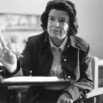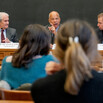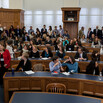Panel Discusses Successes and Failures of International Response in Haiti
Panelists discussed the aftermath of the 2010 earthquake in Haiti and what lessons could be learned from those experiences for future global crisis response at an event at Yale Law School.
Moderator Ali Miller, Associate Professor (Adjunct) of Law and Co-Director of the Yale Global Health Justice Partnership, began by emphasizing that the discussion was intended to step back and look broadly at what went well and badly in Haiti.
“How can a conversation with others be part of changing practices, changing ideas, changing the actual reimagining of what should go on?” Professor Miller asked.
The panel was titled “Re-Imagining Post-Conflict Response: Critical Lessons from Haiti,” and was held on Friday, November 14. The speakers included Patrick Weil, Visiting Professor of Law and Peter and Patricia Gruber Fellow in Global Justice and Founder, Libraries Without Borders; Muneer Ahmad, Clinical Professor of Law at Yale Law School; and Alejandro Pacheco, UN Development Programme (Haiti) and Yale World Fellow.
Professor Ahmad began by explaining how a cholera epidemic came to Haiti via UN Peacekeeping troops and how the UN has persistently failed to acknowledge its responsibility. “You have, then, an institution, one of whose mandates is to develop and promote human rights around the world, completely disclaiming its own responsibility, engaging in conduct that is, I think, fundamentally dishonest and certainly not transparent, and denying to the individuals affected any measure of accountability,” Ahmad said.
The Transnational Development Clinic at Yale Law School, the Global Health Justice Partnership at the Yale Law School, and the Yale School of Public Health, in collaboration with the Haitian Environmental Law Association (Association Hatïenne de Droit de L’Environment) wrote a report called “Peacekeeping without Accountability,” which examined the role the U.N. played in precipitating the crisis and the U.N.’s responsibilities to provide legal remedies to victims of the epidemic. Recently, Professor Ahmad argued on behalf of international law scholar and practitioner amici curiae in Georges v. United Nations, a lawsuit filed in federal court in New York by Haitian cholera victims against the United Nations over the epidemic. That argument focused on the scope of U.N. responsibility notwithstanding international organization immunity.
Alejandro Pacheco gave an inside view of Haiti as he discussed his experiences working for the UN after the earthquake. He was quick to emphasize the positive gains in the country but expressed frustration that many outside organizations failed to communicate with people who knew the country and directed resources toward unsustainable projects.
Regardless of the challenges Haitians face, Pacheco finds it a place of hope. Although the debris left in the aftermath of the earthquake was immense, through the efforts of the citizens of Haiti, the country had the fastest response for debris removal. Pacheco described a common morning scene in Haiti, watching families walking to school on unpaved roads: “You see that despite all those challenges they were facing, they would face them with amazing dignity and hope and joy,” said Pacheco.
Professor Weil mentioned failures (such as trying to rebuild individual libraries, which couldn’t be sustained) and successes (such as a hugely popular bookmobile) of working in Haiti with his organization Libraries Without Borders and emphasized the importance of access to education in relief efforts. “Libraries are the future of equality in education,” Weil said. Libraries Without Borders is an NGO working to increase access to information and dissemination of culture through the promotion of libraries and other projects.
In Weil’s point of view, building infrastructure for higher education should be a priority for crisis recovery. Otherwise, young people will leave Haiti for education. “So, of course, if you want to study, you leave the country. … If you have nothing for higher education, then you train the people … and then they leave,” said Weil.
Weil also talked about the Ideas Box, a portable, multi-media toolkit designed for vulnerable populations to discover, learn, connect, and create. Libraries Without Borders, in connection with UNHCR and designer Philippe Starck, created the box to meet the needs beyond food, shelter, and health care that communities in crisis need to forge social ties and support education. In February 2014, the first Ideas Box kits were deployed in refugee camps in Burundi for Congolese refugees and have had a decisive role in building community. A sample Ideas Box was on view in the YLS courtyard on November 14.
All of the panelists expressed frustration with the way the world views Haiti. Pacheco lamented that the media only reports on the negative things that happen there. Ahmad was concerned that the world could only see Haitians as victims. During the questions at the end of the event, a member of the audience from Haiti expressed surprise and gratitude for what he had heard from the panelists. “It’s a big pleasure for me to hear you talking about problems in Haiti,” he said. “I didn’t think that other people in the world were thinking about problems in Haiti.”
The event was co-sponsored by Libraries Without Borders, La Société Française, Lillian Goldman Law Library, Yale University Library, Yale UNICEF, Yale Law School Office of International Programs, and Yale Global Health Justice Partnership.


